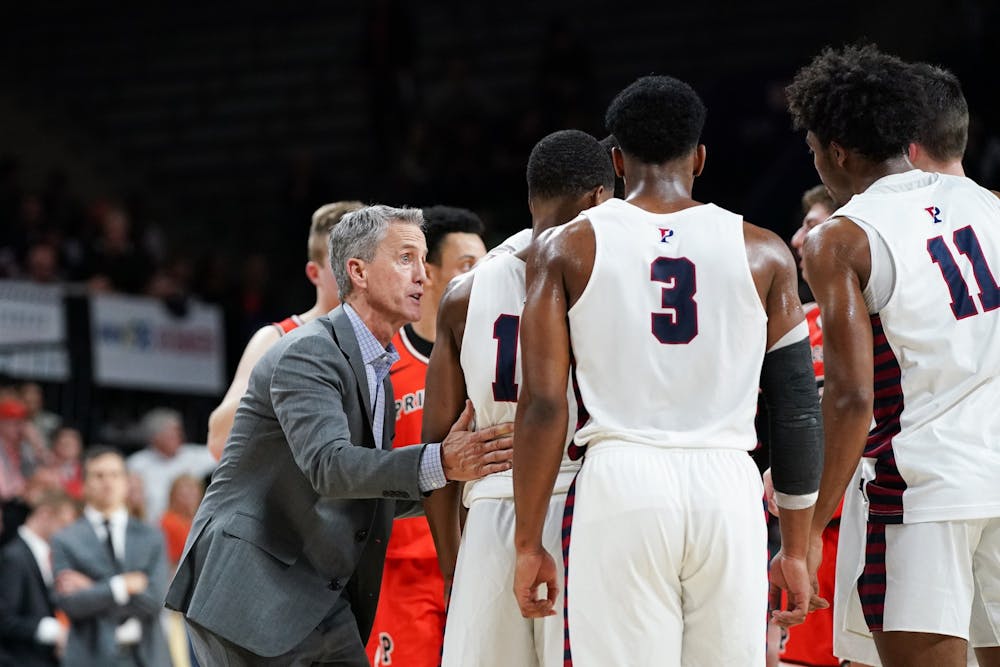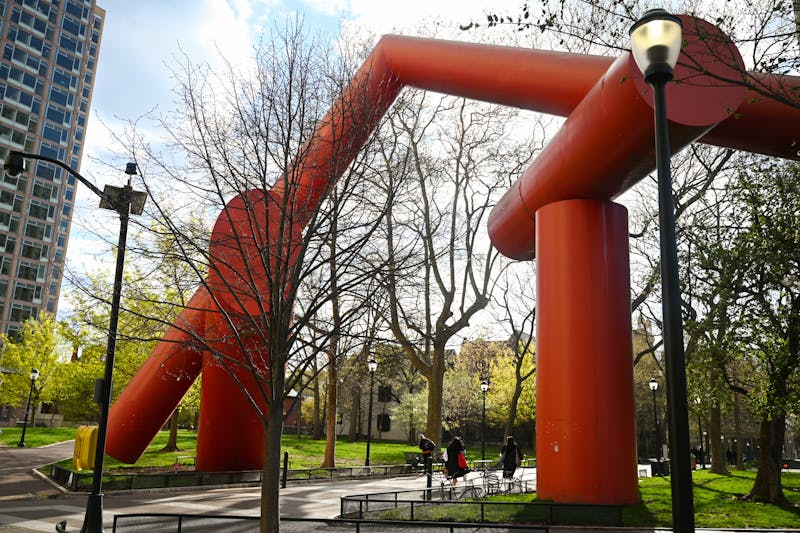
Penn men's basketball coach Steve Donahue's time with the Quakers dates back to being an assistant coach for Fran Dunphy.
Credit: Chase SuttonSteve Donahue’s coaching story is not all that different from his peers at the Division I level. Before he held the top spot at Penn, Donahue worked his way up the ladder, and part of that work took place at the Palestra as an assistant men’s basketball coach.
From 1990 to 2000, Donahue worked on head coach Fran Dunphy’s staff and proved himself to be an integral part of one of the most successful stretches in Penn basketball history. During those years, the Quakers had a 114-26 record in conference play and captured six Ivy League titles.
However, the lessons Donahue learned behind the scenes during that decade were even more important to him than the on-court results.
“What I took from ‘Dunph’ was most importantly, off the court,” Donahue said. “I was 27 years old and basically a high school assistant before joining his staff. But seeing how he handled people — whether that’s a janitor or a high school coach — he made everyone feel good about themselves. He gave a positive impression of the program every time he was out there.”
However, as Donahue attests, that positive impression was not easy to cultivate. Upon Dunphy’s arrival to the program in 1988, Penn basketball was nowhere near the level to which it would eventually rise. Only an assistant at the time, watching Dunphy lead and contribute to the team's renaissance left an indelible impact on Donahue.
“You can’t tell the story without where it started, and we weren’t very good when ‘Dunph’ took over, so that building process is something I took with me throughout my career,” Donahue said. “I learned that we’re going to have to work very hard, we’re going to have to bring in good people, and we need everybody pulling in the same direction. Bringing that all together, that’s where ‘Dunph’ really separated himself.”
When Donahue returned the program as a head coach in March of 2015, he found himself in a similar situation. The team had endured losing season after losing season and, as Donahue said, “there was a negativity around the program, similar to what we experienced when ‘Dunph’ took over, just because people cared so deeply about it, and it wasn’t successful.”
To turn that negative atmosphere around, Donahue relied on the wisdom imparted to him by his former boss and molded the treatment of his assistants after the way Dunphy treated him.
“The beauty of ‘Dunph’ was that he had no ego,” Donahue said. “If I had a strength, or if any of the other assistants had a strength, he allowed us to use it. He knew exactly what he wanted, but he would never step on toes. He was great at making the assistants feel like they were integral parts of what he was doing. He empowered each of us, and that’s how he was so successful at building this program.”
Although Donahue would like to follow Dunphy’s model to a tee, he freely admits that he has a long way to go.
“I try to take in as much as I can, but I’m probably nowhere near as open to suggestions as I should be and certainly nowhere near where he was,” Donahue said. “I try to think of those lessons from ‘Dunph,’ but I’m still amazed at him.”
In Donahue’s first four seasons at the helm, he is three for three on Ivy League Tournament appearances and holds one Ivy title as well.
When asked whether or not the Penn coaching legend was surprised by his former assistant’s success in the head coaching role, Dunphy said that Donahue’s earlier work on his staff heralded a bright future as a head coach.
“I think every day, I saw in him a desire to learn, a desire to teach, and a desire to be the best coach that he could be every time he came to work,” Dunphy said. “He paid a lot of dues to finally get his opportunity to be a head coach. When he was very successful at it, I wasn’t even a little bit surprised.”
For Dunphy, watching the success of his former assistants is even more rewarding than his own victories.
“All of the guys that I have had a chance to coach with have done great work with young people,” Dunphy said. “I think that’s the greatest joy that I get — to watch them coach their teams, seeing how good they are at being mentors and how much pride they have in helping kids.”
Of course, Dunphy is much more than a passive observer in that success, and his influence can be felt every time Donahue, his protégé, walks the Palestra sideline.
The Daily Pennsylvanian is an independent, student-run newspaper. Please consider making a donation to support the coverage that shapes the University. Your generosity ensures a future of strong journalism at Penn.
Donate







